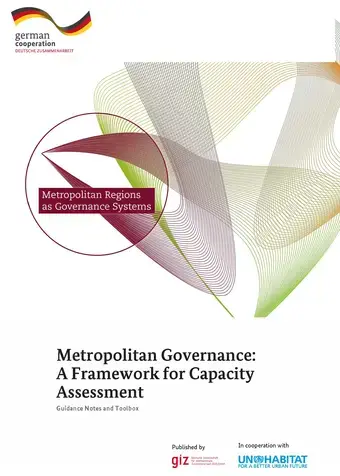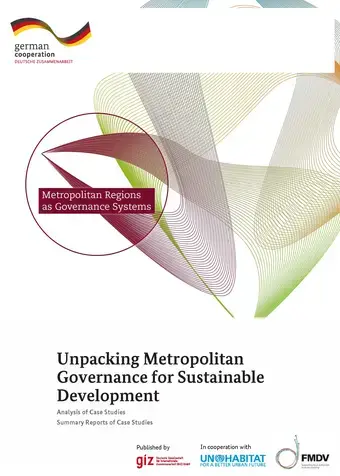
UN-Habitat and GIZ have developed the Metropolitan Capacity Assessment Methodology (MetroCAM) as a joint contribution to implement urban sustainable development agendas and bring them to the metropolitan scale. It complements the Unpacking Metropolitan Governance series. With this modular toolbox, urban stakeholders are able to assess existing capacity in a metropolitan setting, future needs, and potential trigger points and finally identify options for change. By tackling a particular metropolitan challenge, the MetroCAM provides instruments and incentives for municipalities to cooperate beyond administrative boundaries.
The MetroCAM is also a process to foster dialogue and build consensus. The first part of the methodology illustrates the required initial steps for a successful assessment, covering aspects like the composition of the assessment team, finding consensus on the most pressing metropolitan challenge and sequencing activities based on resource and time constraints. The heart of the methodology comprises of 12 tools – a bouquet of options which can be selected regarding the specific needs and challenges. The methodology is primarily directed to local and regional governments’ representatives willing to drive the change and engages urban practitioners, metropolitan actors, researchers and development organisations.

This case study analysis forms part of the publication series “Unpacking metropolitan governance” that documents experiences and gives hands-on approaches for stakeholders in the field of sustainable development of metropolitan regions. The analysis and the summary reports of the case studies of Metropolitan Bandung (Indonesia), Guadalajara Metropolitan Area (Mexico) and e-Thekwini (Durban, South Africa) are following the joint publication of the discussion paper “Unpacking Metropolitan Governance for Sustainable Development”, UN-Habitat, GIZ and FMDV encourage a critical and intensive discussion among policy makers and practitioners about the findings and recommendations offered by the discussion paper, case study reports, and analyses. The publication series shall serve as a reference point for the ongoing international discussion on transforming urbanization, implementing the Sustainable Development Goals at the local and metropolitan level and thereby contribute to the Habitat III debate.
In addition, GIZ and UN-Habitat have developed a Metropolitan Capacity Assessment Methodology as a modular toolbox to assess existing capacity in a metropolitan setting, future needs, and identify options for change.
The last several decades have seen a change in the legal landscape relating to land in Puntland and Somaliland. Traditionally, both regions have consisted primarily of large swaths of rural and agricultural land, owned in common by clans and subclans in accordance with customary law. While the customary system is also capable of recognizing individual rights and grievances of members of the community in question, it remains primarily accessible to male members of the majority clan.
Though women from both minority and majority clans report that the customary system is often inaccessible to or biased against them, the community at large perceives it as more trustworthy and less prone to undue influence than the courts.
Decisions made through the customary system also tend to be fast and efficient. This report discusses the Land Dispute Tribunals in Somaliland and the Land Dispute Resolution Committees in Puntland. The LDTs are intended to be hybrid institutions capable of harnessing benefits from both the formal and the customary system.
Throughout the world, violence, delinquency and fear undermine the basic right of individuals to live in peace and fully benefit from a healthy and sustainable community. These elements make no real distinction between prosperous and poor cities, and impose aconsiderable cost on the population, particularly through the decline of communities, the increase in health and security expenditures and the deterioration of investments. Violence and fear directly threaten life in society, good governance and the sustainable development of the world’s communities and neighbourhoods.
This joint publication “Unpacking Metropolitan Governance for Sustainable Development” is the product of a close cooperation between GIZ and UN-Habitat. Against the background of rapid urbanization, new forms of power relations between the different levels of government emerge and stronger coordination and cooperation is required.
GIZ and UN-Habitat are both convinced that effective metropolitan governance is crucial for transformative development, considering social, political, economic and environmental impacts. While the subsidiarity principle is still valid and valuable, some decisions are most effectively implemented at a metropolitan level that follows the functional area. Climate change, natural disasters or economic development do not stop at administrative boundaries, hence joint action needs to be taken.
Infrastructure needs can be better solved through joint forces and coordination between administrations and different stakeholders. This study shall give insights into ways metropolitan regions are governed and how it relates with the good urban governance principles.
In addition, GIZ and UN-Habitat have developed a Metropolitan Capacity Assessment Methodology as a modular toolbox to assess existing capacity in a metropolitan setting, future needs, and identify options for change.
UN Habitat has been working in the eastern DRC since 2009, and the purpose of this study is to help better understand and integrate gender issues into existing programming, and to guide future activities to improve and support women’s access to land in the region.
The study seeks to develop a baseline understanding of women’s access to land, with particular focus on the barriers under customary and statutory regimes faced by women as daughters, wives, widows, displaced, and how they are coping with these conditions.
This study aims to examine current land access and youth livelihood opportunities in Southern Ethiopia. We used survey data from the relatively land abundant districts of Oromia Region and from the land scarce districts of Southern Nations, Nationalities and Peoples’ (SNNP) Region. Although access to agricultural land is a constitutional right for rural residents of Ethiopia, we found that youth in the rural south have limited potential to obtain agricultural land that can be a basis for viable livelihood. The law prohibits the purchase and sale of land in Ethiopia. We found that land access through allocation from authorities is virtually nonexistent while land that can be obtained from parents through inheritance or gift is too small to establish a meaningful livelihood.
The land rental market has restrictions, including on the number of years land can be rented out. Perhaps as a result of limited land access, the youth have turned their back on agriculture. Our study shows that only nine percent of youth in these rural areas plan to pursue farming as a livelihood. The majority are planning non-agricultural livelihoods. We also found a significant rural-urban migration among the youth and especially in areas with severe agricultural land scarcity. Our econometric analyses show that youth from families with larger land holdings are less likely to choose a non-agricultural livelihood as well as less likely to migrate to urban areas. We suggest here some measures to improve rural livelihood such as creation of non-farm employment opportunities and improvement of land rental markets. We also argue that as a certain level of rural-urban migration is unavoidable, investigating youth migration is essential to design policies that help the migrating youth as well as the host communities.
Secure land and property rights for all are essential to reducing poverty because they underpin economic development and social inclusion. Secure land tenure and property rights enable people in urban and rural areas to invest in improved homes and livelihoods. Although many countries have completely restructured their legal and regulatory framework related to land and they have tried to harmonize modern statutory law with customary ones, millions of people around the world still have insecure land tenure and property rights.
This report addresses and assesses the issue of tenure security in several countries where government, civil society, the private sector and development cooperation initiatives have been implemented for decades. The selected case studies from fifteen (15) countries (Ghana, Kenya, Ethiopia, Nigeria, Uganda, Zambia, Bangladesh, China, Indonesia, The Philippines, Thailand, Bolivia, Brazil, Chile, Guatemala) ensure not only ageographic balance but they also represent countries with different socio-economic and land-related histories and that have followed different pathways. The studies’ key findings underline the still precariousstate of tenure security in many countries.
The land challenge is central to the broader youth dynamics of migration, employment, livelihoods and belonging. The more than 1.8 billion youth living worldwide represent not only a land challenge, but an untapped potential in moving the tenure security agenda forward.
Youth-led Action Research on Land builds on previous youth and land engagement and consultations that have identified critical needs and knowledge gapsin the space of youth and land.
Today, there are more than 1.2 billion youth in the world, the largest number of youth ever to have existed. These youth live, by and large, in cities and towns; the cities of the developing world account for over 90 per cent of the world’s urban growth and youth account for a large percentage of those inhabitants. It is estimated that as many as 60 per cent of all urban dwellers will be under the age of 18 by 2030. This urban demographic “youth bulge” represents both a challenge as well as an untapped potential in moving the land rights and tenure security agenda forward. Youth are increasingly mobile, social and creative in a rapidly transforming world. This means that the needs and attitudes toward land are changing too.